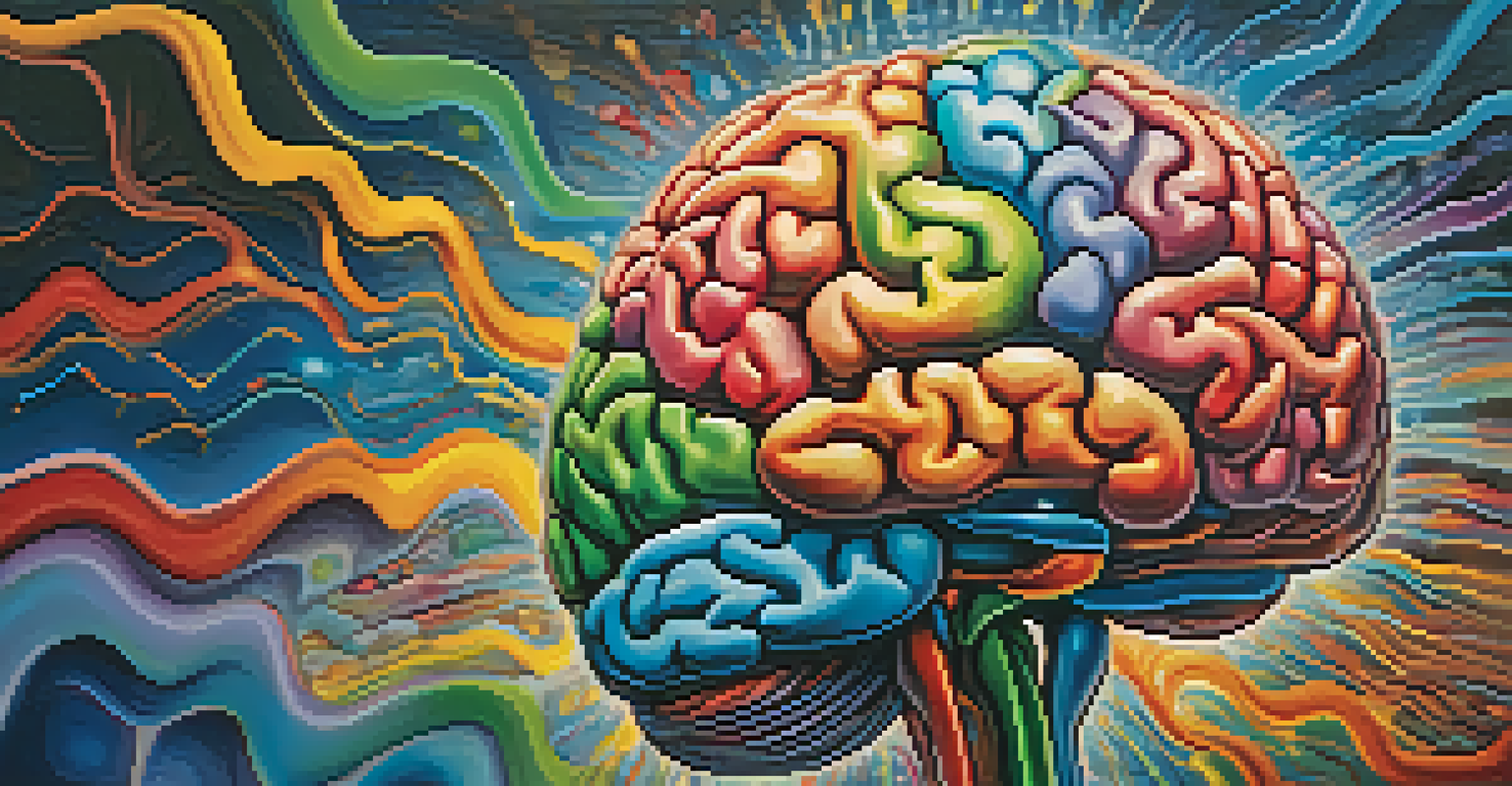Exploring Entheogens: Pathways to Enhanced Empathy and Compassion

What Are Entheogens and Their Historical Context?
Entheogens are substances that have been used for centuries in various cultures for spiritual and healing purposes. These natural compounds, such as psilocybin mushrooms and ayahuasca, are known to induce altered states of consciousness. Historically, they have played a significant role in rituals and religious ceremonies, facilitating deep connections with oneself and the universe.
The experience of communion with others through empathy is, in a sense, the most authentic part of being human.
The use of entheogens dates back to ancient civilizations, where they were often considered sacred tools for insight and guidance. For example, indigenous tribes in the Amazon have used ayahuasca for generations to connect with their spiritual roots. This rich history underscores the potential of these substances to enhance emotional and spiritual well-being.
Understanding the cultural significance of entheogens is essential as we explore their effects on empathy and compassion. By recognizing their historical context, we can appreciate how these substances might offer transformative experiences that foster deeper connections with others.
The Science Behind Entheogens and Empathy
Research indicates that entheogens can significantly influence brain function, particularly in areas related to empathy and social behavior. Studies have shown that substances like psilocybin can enhance emotional responsiveness, helping individuals to better understand and relate to the feelings of others. This heightened sense of empathy can lead to more compassionate interactions in daily life.

For instance, participants in studies involving psilocybin have reported feelings of interconnectedness and unity with others, often describing profound experiences that dissolve personal boundaries. These experiences can yield insights into one's own life while simultaneously fostering a greater appreciation for the experiences of others. This is particularly relevant in a world where social divisions can often lead to misunderstandings.
Entheogens Enhance Empathy
Research shows that entheogens like psilocybin can significantly boost emotional responsiveness, fostering deeper connections and compassion.
By examining the neural mechanisms at play, we can see how entheogens might unlock pathways to deeper empathy. Understanding these effects can pave the way for integrating these substances into therapeutic contexts, promoting healing and connection.
Personal Stories: Transformative Experiences with Entheogens
Many individuals have shared personal accounts of how entheogens have transformed their perspectives on empathy and compassion. For example, a participant in an ayahuasca ceremony may recount a powerful experience of connecting with the pain and suffering of others, leading to a profound commitment to social justice. These stories often highlight the capacity of entheogens to invoke deep emotional responses.
Empathy is about finding echoes of another person in yourself.
Another common theme in these narratives is the shift from self-centeredness to a broader understanding of human suffering. People frequently describe feeling more compassionate towards friends, family, and even strangers after their experiences. This shift can inspire individuals to engage in acts of kindness and support, reinforcing the idea that empathy can be cultivated.
These personal stories serve as compelling evidence of the potential benefits of entheogens. They underscore the importance of sharing experiences to inspire others to explore these pathways to empathy and compassion.
Entheogens in Therapeutic Settings: A Growing Trend
In recent years, the use of entheogens in psychotherapy has gained traction, as mental health professionals recognize their potential to enhance emotional healing. Therapists are beginning to incorporate substances like MDMA and psilocybin into treatment plans for conditions such as PTSD and depression. This innovative approach aims to create a safe space for clients to explore deep-seated emotions and traumas.
The therapeutic benefits of entheogens extend beyond mere symptom relief; they can foster a sense of connection and understanding between the therapist and client. The shared experience of exploring emotions in a heightened state of awareness can deepen trust and empathy within the therapeutic relationship. This dynamic is crucial for effective healing.
Therapeutic Use is Rising
Mental health professionals are increasingly incorporating entheogens into treatment plans to facilitate emotional healing and strengthen therapeutic relationships.
As research continues to unfold, the integration of entheogens in therapy may lead to new methodologies that prioritize empathy and compassion in mental health treatment. This could not only transform individual lives but also contribute to a more empathetic society.
Ethical Considerations: Responsible Use of Entheogens
While the potential benefits of entheogens are promising, ethical considerations must guide their use. It’s essential to approach these substances responsibly, understanding that they can induce powerful experiences that may not be suitable for everyone. Educating individuals about safe practices and potential risks is crucial for fostering a positive relationship with entheogens.
Moreover, the context in which entheogens are used can greatly impact their effects. Setting, guidance, and intention play vital roles in shaping the experience. For instance, using these substances in a supportive, structured environment can enhance feelings of safety and empathy, while unsupervised use can lead to confusion and anxiety.
By prioritizing responsible use and ethical frameworks, we can ensure that the exploration of entheogens remains a pathway to enhanced empathy and compassion rather than a source of harm. This approach will help create a culture that respects both the power and the potential risks of these substances.
Potential Societal Benefits of Enhanced Empathy
As we explore the societal implications of enhanced empathy through entheogens, it's important to consider the broader impact on communities. Increased empathy can lead to more compassionate interactions, fostering environments where understanding and cooperation thrive. Imagine a world where people are more willing to listen, support, and uplift one another—this is the potential that enhanced empathy holds.
Moreover, cultivating empathy can be a powerful antidote to societal issues like division and conflict. By promoting understanding across different backgrounds and experiences, we can bridge gaps that often lead to misunderstandings and hostility. Empathy can serve as a unifying force, encouraging collaboration and community-building.
Responsible Use is Essential
Ethical considerations and responsible practices are crucial for ensuring that the exploration of entheogens promotes empathy without causing harm.
Ultimately, the potential societal benefits of enhanced empathy extend beyond individual relationships; they can contribute to a more harmonious and compassionate world. As we embrace the possibilities that entheogens offer, we can envision a future where empathy is at the forefront of societal values.
Looking Ahead: The Future of Entheogens and Empathy
The future of entheogens and their role in enhancing empathy is full of promise, as ongoing research and cultural shifts continue to evolve. As more studies validate their therapeutic potential, we may see an increasing acceptance of these substances in both clinical and personal contexts. This shift can lead to broader discussions about mental health, spirituality, and the nature of human connection.
Additionally, as society becomes more open to exploring alternative healing methods, entheogens may play a pivotal role in redefining our understanding of empathy. By integrating these experiences into educational and therapeutic settings, we can equip individuals with tools to cultivate deeper connections with themselves and others.

Looking ahead, the journey of exploring entheogens and their impact on empathy and compassion is just beginning. As we continue to learn and grow, the potential for these substances to transform lives and communities is truly exciting.